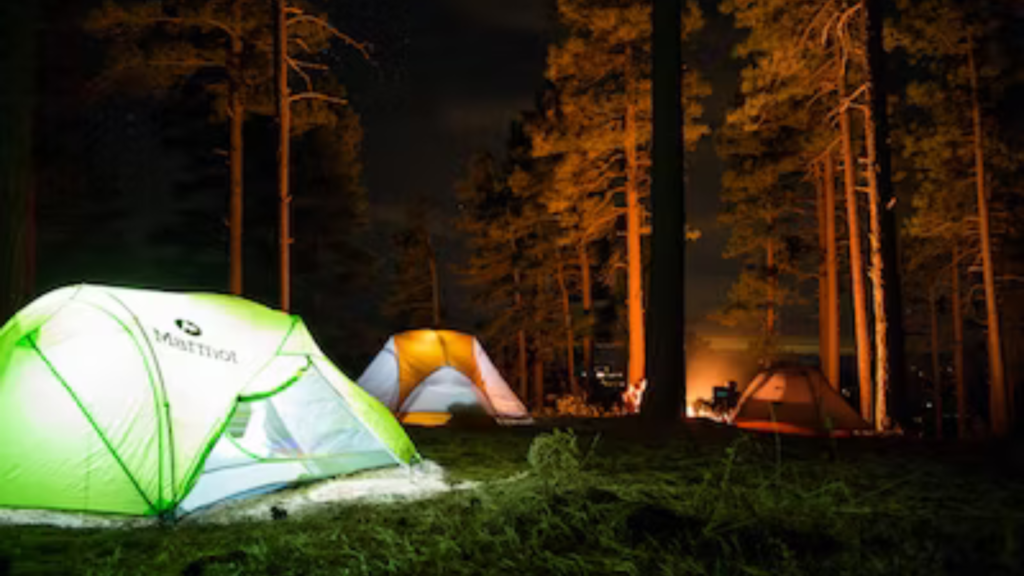
Camping is a popular outdoor activity that allows people to immerse themselves in nature, disconnect from the hustle and bustle of daily life, and enjoy the great outdoors. Whether you’re a beginner or an experienced camper, here’s a comprehensive guide to camping, along with tips and considerations for a safe and enjoyable experience:
1. Types of Camping:
- Car Camping: This is the most accessible and comfortable form of camping, typically done in established campgrounds where you can park your car nearby. You can bring more gear and enjoy amenities like picnic tables and restrooms.
- Backpacking: Backpacking involves carrying all your gear and supplies in a backpack and camping in more remote locations. It’s a more challenging and adventurous form of camping.
- Wilderness Camping: For experienced campers, wilderness camping entails venturing into remote and unregulated areas, often requiring permits and self-sufficiency.
2. Essential Camping Equipment:
- Tent: Choose a tent suitable for the number of campers and the expected weather conditions.
- Sleeping Gear: This includes sleeping bags and sleeping pads for comfort and insulation.
- Cooking Equipment: Pack a portable stove, cookware, utensils, and biodegradable soap for meal preparation.
- Clothing: Dress in layers to adapt to changing weather. Don’t forget rain gear, extra socks, and sturdy footwear.
- First-Aid Kit: A basic kit should include bandages, antiseptic, pain relievers, and any personal medications.
- Lighting: Headlamps and flashlights are essential for safety and convenience.
- Navigation Tools: Carry maps, a compass, or a GPS device to avoid getting lost.
3. Campsite Selection:
- Choose a suitable campsite that adheres to camping regulations.
- Look for level ground, ideally away from water sources to prevent soil erosion.
- Keep a safe distance from wildlife and avoid established animal trails.
4. Safety and Health:
- Let someone know your camping plans, including your destination and expected return.
- Be aware of potential hazards such as wildlife, weather changes, and emergency escape routes.
- Practice proper food storage and waste disposal to prevent attracting wildlife.
5. Camping Tips:
- Plan and prepare your camping trip well in advance, including permits and reservations if necessary.
- Check the weather forecast and pack accordingly.
- Learn basic camping and survival skills, including setting up a tent, building a fire, and purifying water.
- Minimize your impact on the environment by following “Leave No Trace” principles.
- Embrace simplicity and enjoy the tranquility and beauty of nature.
6. Campfire Etiquette:
- Check fire regulations and restrictions in your camping area.
- Use established fire rings or designated fire areas.
- Only burn small sticks and twigs, and fully extinguish the fire before leaving.
7. Camp Cooking:
- Plan simple meals that require minimal cooking and cleanup.
- Follow proper food storage and handling to avoid foodborne illnesses.
- Consider packing freeze-dried or dehydrated meals for convenience.
8. Camping Experiences:
- Camping provides an opportunity for stargazing, hiking, wildlife watching, and connecting with nature.
- Capture memories with photographs, but remember to enjoy the moment without constant screen time.
Camping is a fantastic way to escape the daily grind, unwind, and reconnect with the natural world. Whether you’re camping with friends, family, or going solo, it offers a chance to unplug and appreciate the beauty of the outdoors. By being prepared, respecting nature, and following safety guidelines, you can have a safe and memorable camping experience.

